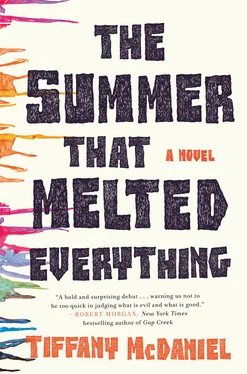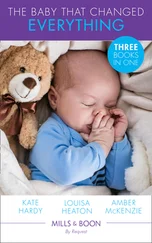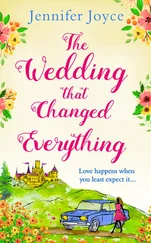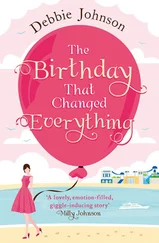Our conversation consisted of her saying my name, me saying hers. Fielding. Mom. Fielding! Mom! Fielding? Mom?
A dying mother is hard to talk to, especially when she starts screaming about a fire. We told her it was put out.
“When?” she asked.
“A long time ago,” we said almost in unison.
I took a wet washcloth and stroked her face. She seemed to like it. She smiled. Said Grand’s name.
“He’s not here, Mom.” I laid the washcloth over her eyes so I wouldn’t have to see them.
“Why ain’t my boy here?”
“He’s with Sal.”
With my palm lying on top of the washcloth, I could feel her eyes pushing like tiny hands trying to push up out of rubble.
“Oh.” She drew her breath. A faintly sketched line. “My boys.”
I went away from her then and thought of Granny, of that suffering we are asked as men to end. As I was packing my suitcase to go to Mexico to buy pentobarbital, the phone rang. It was Dad. He didn’t say a word. All he did was cry. I told him it was a bad connection and to call back. I had to hang up first. I tore up my plane ticket and went around the house, turning on all the faucets. The kitchen, the bathroom, upstairs and down. Sinks and tubs and showers. I wanted to hear the water go down the drains so I wouldn’t have to hear myself doing the same.
After Mom’s funeral, when me and Dad were driving back to the house, he told me to take a turn. Following his directions, I ended up driving to an amusement park off the highway.
“We’re going to ride the roller coasters.” He grunted into his handkerchief.
“You hate roller coasters. And what about what the doctor said about your heart? No quick starts, remember. No big frights.”
He rode every roller coaster in the park that day, as somber as his black suit. His heartbeat escalated, his pulse quickened, but what he wanted to happen did not happen. I’ve never seen a more disappointed man in my life. Every day he returned to the park, but after a month of roller coasters, he did not have the heart attack the doctor assured him he would have under such stress.
He’d gotten so used to the coasters that there he’d be, his chin propped up on the back of his hand, looking out past the loops and turns like he was just taking a Sunday drive while everyone else screamed around him and gripped the bar for dear life.
When the heart attack did finally come, it did so when he was sitting calmly in the La-Z-Boy. Instead of an obituary, I put an invitation in the newspaper. I sat there in a pew of the church, and for every person who walked through the door who wasn’t Sal I took a drink from the flask in my pocket. By the time the preacher asked me to stand and say a few words, the flask was empty. I ended up wobbling on the pulpit while going into the graphic details of what happens when a bullet hits the chest cavity.
The preacher whispered in my ear something like, “I think you should take your seat now.”
“Fuck you, man,” I might have said. And then somebody punched him. I suppose it was me.
I was never meant to be a violent man. I was meant to be my father’s son. My mother’s. But in the end, I became the son of that summer. That summer is my father. It is my mother. It is my violence’s blame.
Sometimes I feel like I’m still fighting my way through the mob to get to the fire. I have to throw a punch. I have to swing a kick. I have to give everything I am to put the fire out. It’s been that fight my whole life.
I haven’t been back to Mom’s and Dad’s graves since. I don’t even remember the name of the Pennsylvania cemetery anymore. Sometimes I walk to the cemetery up the road from the trailer park here and pick a couple of graves and pretend they’re Mom’s and Dad’s. I stand over them and chat about this and that. It’s always light conversation between us, something a gnat would whisper in their ear, certainly nothing to tunnel into the dark about. They’ve already got their own huge terrors. Why disturb them any more?
Before I leave them, I always lay a flower down for each and go walking for as far and as long as my aching body will allow.
I’ve not been happy with aging. My once supple limbs and previously bendable joints are now as stiff as layers of cardboard stapled together. I used to be tall, like my family, but arthritis is a bending demon, and in that, a shortening one. But the worst part is the pain that intrudes and clings like venomous batter being poured until it packs up under my skin in lumps and knots that throb like the heartbeat of thunder.
My hands hurt me the most. You wanna know the hurt? Hang a piece of wood up and punch it from sunrise to sunset. See the sick swells of your knuckles, like balls of tightening wire. Pain is our most intimate encounter. It lives on the very inside of us, touching everything that makes us. It claims your bones, it masters your muscles, it reels in your strength, and you never see it again. The artistry of pain is its contact. The horror of it is the same.
Pain is a thing that speaks, and what the pain is telling me is that I’ve been irresponsible in resting my body. From the time I was seventeen, I worked every single day at breakneck pace, climbing up and down ladders, dismantling brick and stone while pushing my body to stay agile across the expanses of roofs.
While steeplejacking was my preferred occupation, I was like Elohim and did all kinds of work. I burnt brush, laid concrete, any and all construction I could get — hell, I was even a logger for a bit. I’ve done ironwork, rigging and welding and working with heavy steel. I took the shifts no one else wanted. I’d go from one job to another. Then there was all the fucking I did, which is its own toll on the body. I was trying to earn my way to sleep. It did not happen.
And thus I am pain in every inch of my mind, in every inch of my body. I am the endless flailing, the endless falling, the endless story of what happens to a man who cannot let go.
I think about my death. I know it is the long hallway of burning doors that awaits me. I know it is the real devil I go to eternity with. I wonder about the body I leave behind. How soon the flies will come. How soon I will be found. They’ll put me into the ground, not for respect but to be rid of the smell. There will be no handkerchiefs drying in the horizon. I will go to death without the give of tears. Maybe the neighbor boy will shed something. Maybe he will say my name like I mattered.
I might show the boy my scrapbook. Red leather like Elohim’s. Sometimes I think the scrapbook is full of Grand and Sal, Mom and Dad, and even Elohim. It’s hard to tell the difference between a picture of them and one of a chimney taken apart. I feel like I’ve felled them all.
The other day I asked the boy if he’d like to go for a walk. I haven’t walked with anyone in thirty years. And suddenly there we were, walking down the road past saguaros and desert. I thought maybe we just might keep walking all the way to Ohio, and it might be all right if we did because I’d have him by my side.
But then we saw it, lying by the edge of the road.
“Poor fella.” I approached its lifeless form.
“Mr. Bliss?”
“It’s okay, boy. It’s just a deer. Been hit, poor thing.”
I squinted and saw antlers that by their size made the deer a young buck. Its blood had a breakfast quality to it, like something to be spread on toast.
I turned back to the boy. “It smells like strawberries.”
“Mr. Bliss, maybe the heat is gettin’ to ya. Maybe we should go back home?”
I looked back down at the deer and saw its belly rise. “My God. It’s still alive. What pain it must be in.” I thought of purpling organs. Of wounds with brutal edges. Of veins unraveling into rivers on a map to the grave. “We’ve got to help it on its way. Put it out of its misery. I’ll do it. You’re still just a boy.”
Читать дальше












